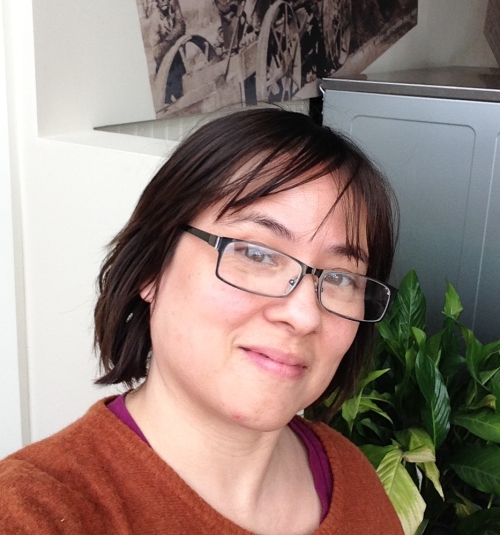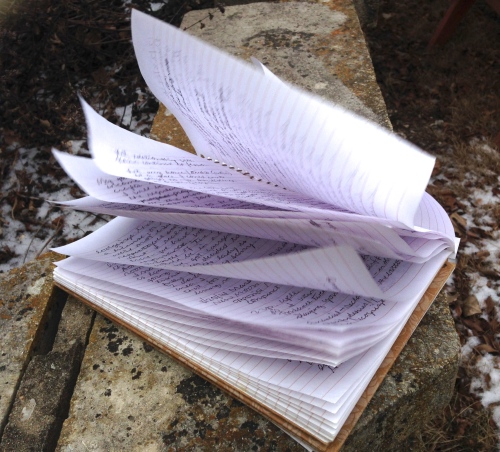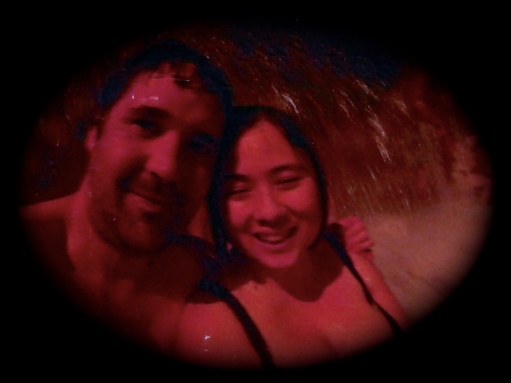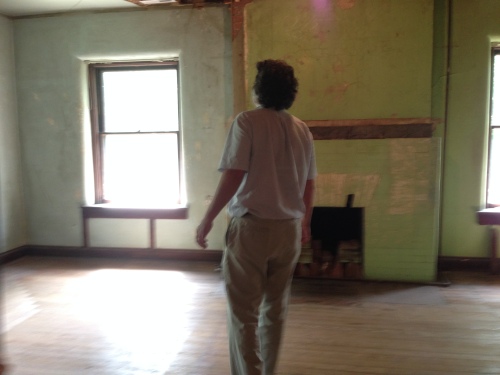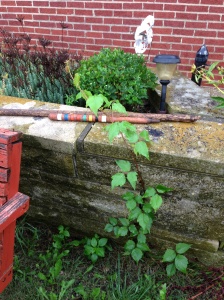This’ll bring us up to the present. First decade, second decade, twenties, thirties.
41. Kiran was about seventeen or eighteen months old when my Mom died. “Baba” was grandma since Rowan started to talk, and we saw Kevin’s mom frequently, so my mom became Baba Leona. A few weeks before she passed, Kiran started calling her Bona.
There was a period when Caryn Robson came over for a couple hours every week to watch the girls so I could write. I didn’t get much writing done, but knowing she would be coming every week was a lifeline. Often we would spend much of the time chatting, or I would be just getting around to putting lunch on the table when she arrived. After Mom’s funeral, the next time Caryn came over, we ended up sitting on the floor of my bedroom, Caryn behind me, releasing trigger points in my shoulders. When I started crying, she wrapped her arms around me and held me. Kiran was nearby, solemnly watching.
The next day, or maybe the day after, she said to me, “Bona died.”
“Yes. Bona died.”
“I saw Bona.”
“We saw Bona at the funeral home.”
“Bona was hugging you.”
“When was she hugging me?”
“Miss Caryn was here.”
“I was sitting on the floor and Miss Caryn was hugging me.”
“Yes. Bona was hugging you.”
“Bona was hugging me when Miss Caryn was hugging me?”
“Yes.”
“You saw Bona?”
“Yes.”
I had many more questions, but we seemed to have reached the limit of her ability to verbalize. She stopped talking then, satisfied that I’d gotten the main point, that after mom died, Kiran saw her with me, holding me in my grief.
Kiran doesn’t remember it anymore.
42. I wasn’t sure I wanted to send the kids to school, and preschool seemed like basically an ad for school. Rowan was very attached to me anyway, but because she was born in early November, she was almost four by the time the school year started. Still, I hesitated. My mother-in-law was on the preschool board, so I felt a certain amount of pressure to send her. I resisted. If she went to preschool, it would be that much harder to say no to school later. She would think of homeschooling as a deprivation.
One day Rowan was driving me crazy. Whatever I said, she ignored. Whatever I wanted her to do, she did the opposite. It went on all day, and really it had been building for a week. Clearly I had no control over this child whatsoever. Finally I’d had enough, and the words just came out of my mouth: “That’s it! You’re going to preschool. We’ll see if someone else can do any better with you than I can.” Sending a child to preschool because she was beyond my control seemed like the weakest possible reason, but I really was at my wit’s end. I couldn’t think of any other way to deal with her.
Her behavior changed immediately. Rowan started preschool a couple weeks later. She loved every minute of it, and was even disappointed when she found out it was only two mornings per week. Later I looked back and realized that it was precisely what she’d needed: to assert her individuality, to take the next step in separating from me. The words that popped out of my mouth were exactly the right ones.
43. I don’t remember what we were thinking when we planned this trip, but Mark Ferguson was getting married in Chicago, and I wanted to see my sister in upstate New York, and Niagara Falls was between the two places. When I saw it as a child, I was impressed, but as an adult, it was profoundly moving. We took an elevator deep into the earth, then walked a long tunnel to a boardwalk so we could walk right up to the edge of the falls. A little stream broke over a rock and fell onto the platform. That tiny stream was immensely powerful. This place where the water would devour the earth, were most of it not diverted before it even gets to the falls. And yet, this little bit of the remainder packed easily enough power to knock a person down. I planted my disposable sandals on the wet wood and held out my arms to open myself to the full force of the water. It was a ritual bath. It was a baptism. For days I was stunned, wondering that anyone could leave that place not knowing it is a sacred node of water energy.
As we returned to the surface, five-year-old Rowan said, “That’s the wettest I’ve ever been in my life!”
 44. I was working on the novel that would become Post Rock Limestone Caryatids. I was well into it with maybe 40,000 words. That doesn’t sound like very much now, but it was a huge struggle at the time. One day I was sitting in front of the computer, not feeling too inspired, when the phone rang. I got up to answer it, and when I came back, Toulouse was sitting on the keyboard, and the screen was blank.
44. I was working on the novel that would become Post Rock Limestone Caryatids. I was well into it with maybe 40,000 words. That doesn’t sound like very much now, but it was a huge struggle at the time. One day I was sitting in front of the computer, not feeling too inspired, when the phone rang. I got up to answer it, and when I came back, Toulouse was sitting on the keyboard, and the screen was blank.
Yes, the file was empty. The cat had deleted my entire novel.
Yes, I had a back-up copy. I only lost a few sentences.
45. Trying to learn and use Photoshop had always been an exercise in pulling out my own hair. I asked Kevin to help me design a cover for my book, but he bogged the project down with alternative ideas that would make the whole design much more complicated, but, in my opinion, wouldn’t improve it significantly. I decided to bite the bullet and learn Photoshop. Whenever I had a question, I googled it, a strategy Kevin often espoused. Each step took forever, but somehow I managed to create a workable design. It was an amazing achievement for me.
Later, when I tried to make a cover for another book, I found I could neither remember nor figure out how to do what I’d done before. It was as if it had never happened.
46. After a couple years of occasional puttering, I got my studio not entirely complete, but into a condition in which I could work in it. Steve Thompson did a lot of work. Without his input, I couldn’t have gotten it done. I chose a gaudy, sunshiny yellow for the walls. Steve thought that color was totally wrong, and tried to talk me into something softer, but I ignored him. It’s a room where I’ve had days of sitting at the desk for hours, writing, revising, publishing, promoting. I go in as early as I can get there in the morning, and if I let myself, I can get lost in the work.
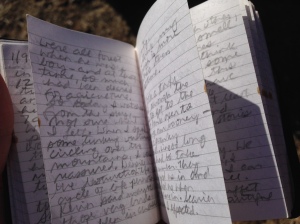 47. Our trip to Costa Rica straddled my birthday. It was my second time there. The first I wished I’d journaled more; so this time I made time during the trip to write down as much as I could remember, most days. After we got home, I started blogging our experiences in this magical place, and intended to write at least one post for every day we were there. I did several, before the project faltered. But still, I think the Costa Rica Diary blog posts are some of my best writing here on Veronica’s Garden.
47. Our trip to Costa Rica straddled my birthday. It was my second time there. The first I wished I’d journaled more; so this time I made time during the trip to write down as much as I could remember, most days. After we got home, I started blogging our experiences in this magical place, and intended to write at least one post for every day we were there. I did several, before the project faltered. But still, I think the Costa Rica Diary blog posts are some of my best writing here on Veronica’s Garden.
48. Shortly after the new year began, before the end of my term as a 48-year-old, I made these goals/resolutions for the year:
Have a working dishwasher.
Girls have their own rooms.
Publish 2 more short stories.
Have a solid draft of Witchcraft novel by year end, ready to seek an agent or self-publish.
Find my birth dad, George Mah.
Manage my health effectively for lasting wellness. (Yoga 4x/week)
Massage Kevin regularly, minimum of 12 times through the year.
Clear/organize house.
Make progress on back debt.
I published four stories, so I exceeded that goal. I’m averaging yoga twice/week these days, and seeing benefits from it. Massaged Kevin three times. As for the others, I failed every last one.
49. What I did instead of working on those goals was spend most of the year struggling with bureaucracies. The Kansas Dept. of Revenue was claiming we owed back Transient Guest Taxes from the motel we’d closed two years prior, while our health insurance premiums grew to unmanageable magnitude. Talking on the phone, navigating institutional websites, hunting through files for papers, these became my unpaid part-time job. Astrologer Kaypacha, aka Tom Lescher, said repeatedly in his weekly forecasts that 2016 would be a year of purification. Apparently, for me, purification means doing the tedious business of managing finances.
Sometimes it occurs to me, normal people do all these things all the time. I don’t know how they do it. And people who work forty hours/week, when do they do these things? Living as a normal adult continues to be my biggest struggle, my most persistent failure.
50. On my birthday, I had a wonderful massage from Lana at Southwind Health Collective in Lawrence. A few minutes into the session, she said, “I’m getting that there’s something that you’re really, really worried about. Is that right?”
I said, “Yes.”
She said, “I’m also getting the message that it’s gonna be all right.”
***
So there we go. It may be as hard for you to believe as it is for me, but I have lived fifty years. I have the memories to prove it.
